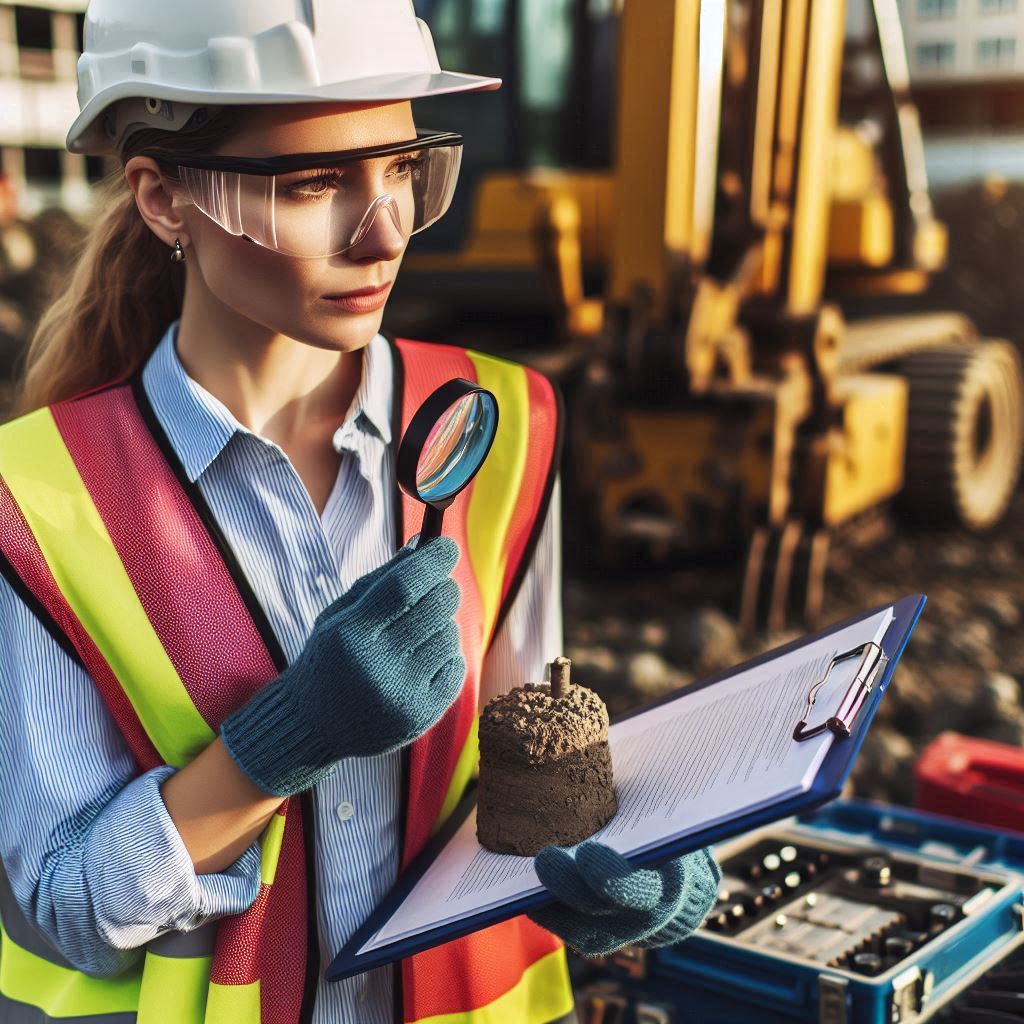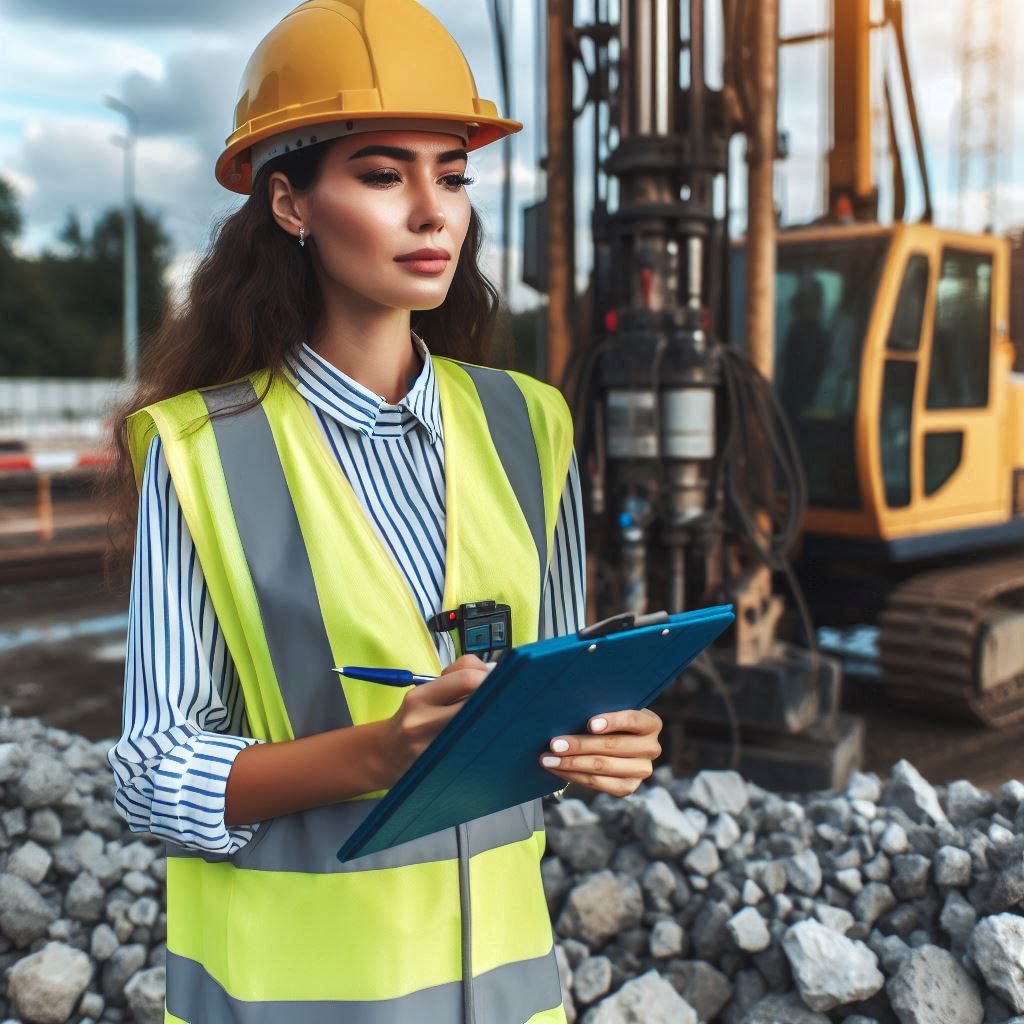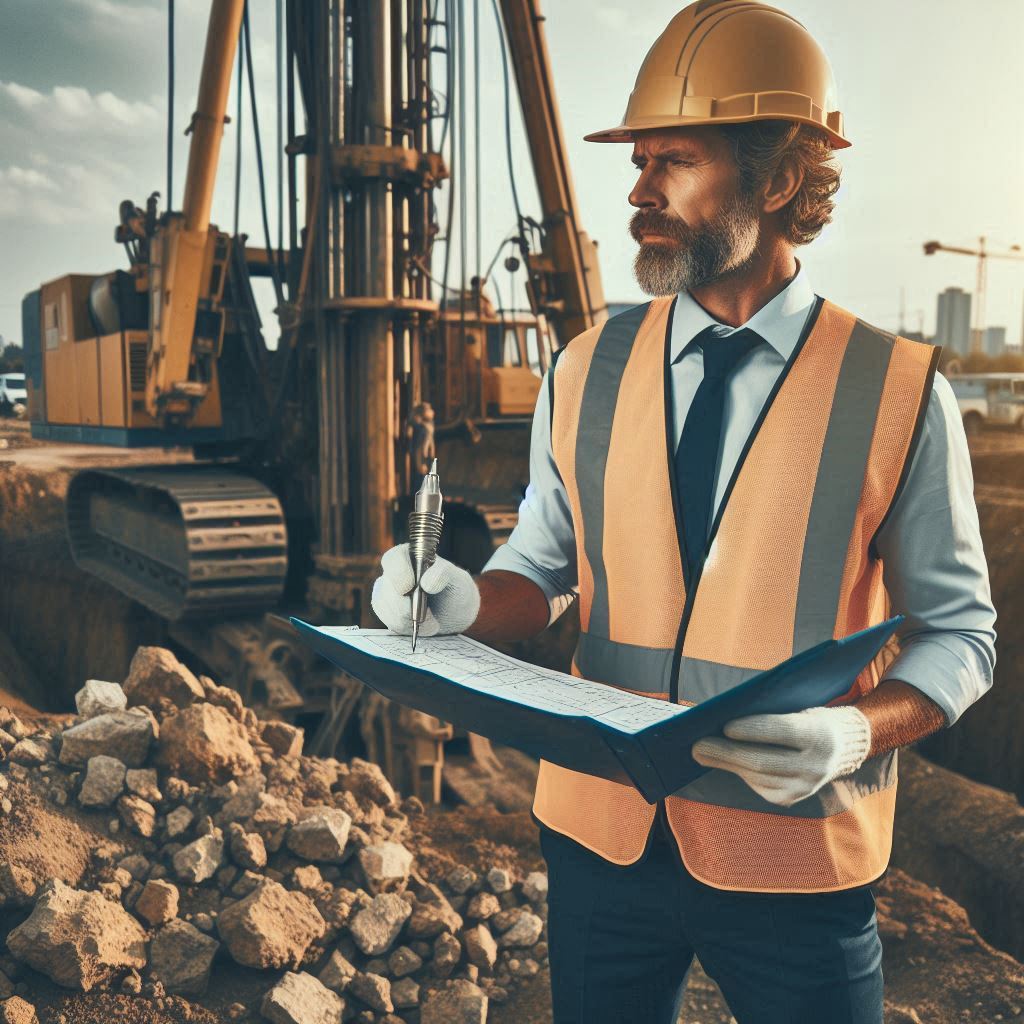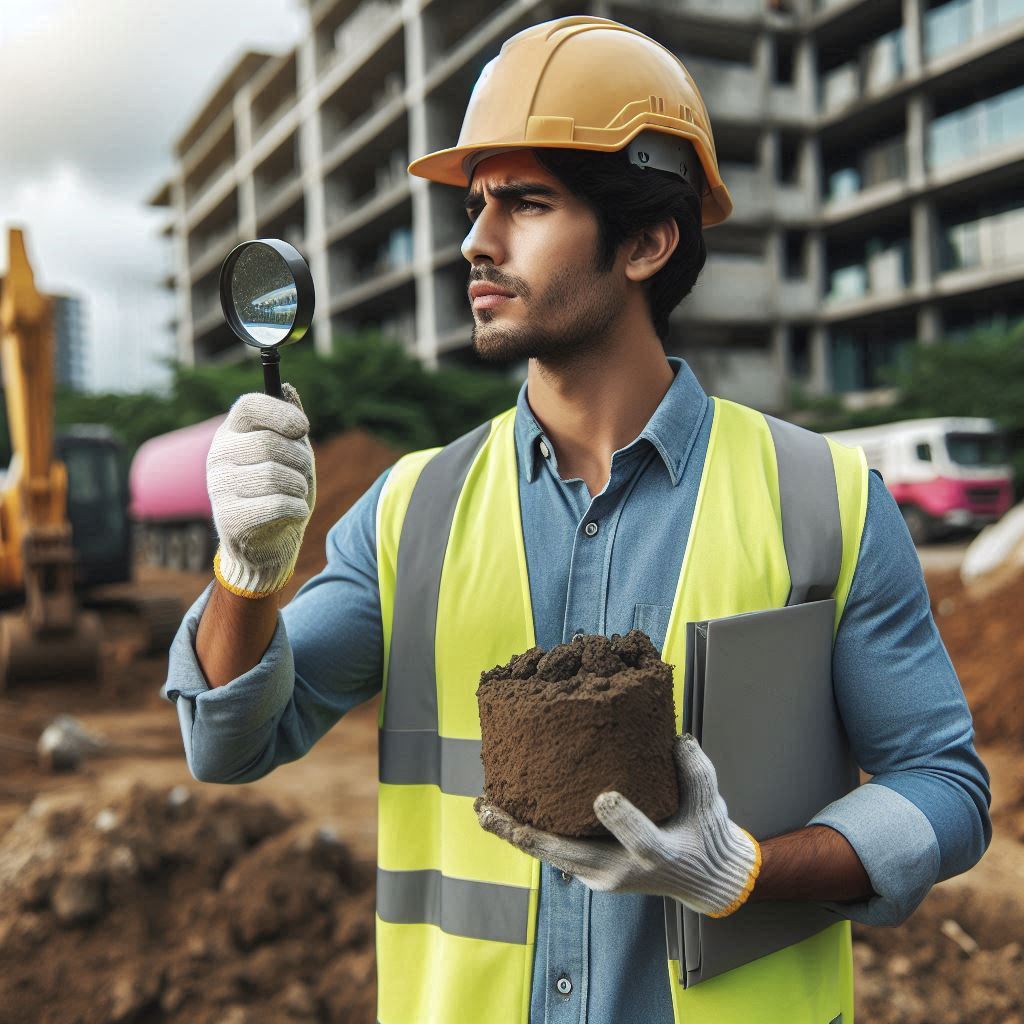Introduction
Women in geotechnical engineering are making remarkable strides in a field traditionally dominated by men.
The presence of women in STEM fields has historically been limited by significant barriers.
These barriers include restricted access to educational resources, fewer career opportunities, and systemic gender biases that have persisted over time.
Women often faced stereotypes that questioned their technical abilities and discouraged them from pursuing careers in engineering.
In the geotechnical engineering industry, these challenges were especially evident.
The field‘s demanding technical requirements and the prevailing male-centric culture contributed to lower representation of women.
Despite these obstacles, women have begun to make notable contributions, challenging stereotypes and proving their capabilities.
Breaking barriers in geotechnical engineering involves creating a more inclusive environment and ensuring equal opportunities.
Women are now leading innovative projects, conducting critical research, and assuming influential roles within the industry.
Embracing diversity and addressing historical biases are key to fostering a more equitable and dynamic field.
As the industry evolves, supporting and celebrating the achievements of women will drive progress and inspire future generations.
The Underrepresentation of Women in Geotechnical Engineering
Geotechnical engineering, a crucial field within civil engineering, remains notably underrepresented by women.
Current statistics highlight this disparity, showing that women make up only about 15-20% of the geotechnical engineering workforce.
This figure is significantly lower than the representation of women in other engineering disciplines and reflects a broader issue of gender imSuccess Stories of Women in Geotechnical Engineering
Highlight their achievements and contributions to the fieldbalance in technical fields.
Despite efforts to improve diversity, geotechnical engineering continues to lag behind in achieving gender parity.
Several factors contribute to this underrepresentation.
One significant challenge is the persistent gender bias and stereotypes that question women’s technical skills and abilities.
These biases can influence hiring practices and promotion decisions, creating an environment where women may feel undervalued or excluded.
Gender biases also manifest in the form of subtle discrimination, which can undermine women’s confidence and career progression.
The demanding nature of geotechnical work poses another obstacle.
The field often requires extensive fieldwork, including site inspections in challenging conditions and remote locations.
Such demands can be a deterrent, particularly when combined with the industry’s reputation for long hours and high stress.
These aspects may disproportionately affect women, especially those who balance professional responsibilities with family and personal commitments.
Share inspiring stories of successful women in the industry
Geotechnical engineering is a field dominated by men, with women significantly underrepresented in the industry.
Statistics on the lack of women in geotechnical engineering
The lack of female role models and mentors in geotechnical engineering further exacerbates the problem.
Without visible examples of successful women in the field, aspiring female engineers may lack the guidance and inspiration needed to pursue and advance in this career.
Mentorship is crucial for professional development, and the absence of female mentors can hinder women’s career growth and retention in the industry.
Work-life balance is another significant challenge.
The rigorous schedules and travel requirements in geotechnical engineering can impact women who often juggle multiple responsibilities at home and work.
Achieving a balance between professional demands and personal life remains a persistent issue, affecting job satisfaction and long-term career commitment.
Addressing these challenges is essential for improving gender representation in geotechnical engineering.
Initiatives such as mentorship programs, gender-inclusive policies, and supportive work environments can make a significant difference.
Encouraging educational programs that inspire young women to pursue careers in engineering and promoting flexible work arrangements are steps in the right direction.
By actively working to overcome these barriers, the geotechnical engineering industry can create a more balanced and inclusive workforce, benefiting from the diverse perspectives and skills that women bring to the field.
Challenges Faced by Women in Entering and Advancing in Geotechnical Engineering
Women pursuing careers in geotechnical engineering face numerous challenges that can impede their entry and advancement in the field.
These challenges include systemic biases, work environment issues, and a lack of support networks.
Systemic Bias and Stereotypes
One of the most significant barriers is systemic gender bias. Women often encounter stereotypes that question their technical skills and suitability for engineering roles.
Such biases can affect hiring practices, performance evaluations, and promotional opportunities.
These prejudices create an environment where women may feel undervalued and less confident in their abilities.
Work Environment and Fieldwork Demands
Geotechnical engineering often involves demanding fieldwork, including site inspections and project assessments in challenging conditions.
These tasks can be physically and logistically demanding, which may deter some women from pursuing or continuing in the field.
The perception that the field is male-dominated and requires extensive time away from home can also contribute to reluctance.
Lack of Female Role Models and Mentors
The scarcity of female role models and mentors in geotechnical engineering is another significant challenge.
Without visible examples of successful women, aspiring female engineers may lack the guidance and encouragement needed to navigate their careers.
Mentorship is crucial for professional development and career advancement, and its absence can impede women’s progress in the field.
Work-Life Balance
Achieving a work-life balance in geotechnical engineering can be particularly challenging. T
he demanding nature of the job, including long hours and frequent travel, can impact personal and family life.
Women, who often bear a greater share of domestic responsibilities, may find it difficult to manage these demands, affecting their career satisfaction and progression.
Professional Networking and Support
Networking and professional support are essential for career advancement.
Women in geotechnical engineering may find it challenging to build professional networks due to the smaller number of women in the field.
Limited networking opportunities can restrict access to career growth, information, and job opportunities.
Institutional and Cultural Barriers
Institutional and cultural barriers within organizations can also hinder women‘s advancement.
These barriers may include a lack of family-friendly policies, inadequate support for returning mothers, and workplace cultures that do not fully embrace diversity.
Addressing these issues requires organizational change and commitment to fostering an inclusive environment.
Overcoming these challenges is essential for increasing female representation and success in geotechnical engineering.
Addressing systemic biases, creating supportive work environments, and promoting mentorship and networking opportunities can help women enter and advance in the field.
By tackling these barriers, the geotechnical engineering industry can become more inclusive and benefit from a diverse range of talents and perspectives.
Read: Biomedical Engineering: Regulatory Affairs
Success Stories of Women in Geotechnical Engineering
Inspiring Stories Of Successful Women In The Industry
Geotechnical engineering has traditionally been a male-dominated field, but there are numerous inspiring stories of successful women who have broken barriers and made significant contributions to the industry.
Women in geotechnical engineering have made profound contributions, breaking barriers and setting new standards in the field.
Dr. Emily C. Rogers, a professor renowned for her research on soil-structure interaction, has developed advanced models that enhance infrastructure resilience against dynamic loads like earthquakes.
Dr. Leah M. Thompson is celebrated for her expertise in geotechnical risk management, creating methodologies that have significantly improved safety in large-scale projects.
Eng. Maria Fernandez, a leading consultant in Latin America, has pioneered soil stabilization techniques, addressing critical challenges like landslides and erosion.
Dr. Aisha Ahmed has advanced environmental geotechnics with her innovative use of geosynthetics for site remediation, promoting sustainable practices.
Megan Liu, a project manager specializing in foundation engineering, has successfully led complex projects while mentoring young women in the field.
Dr. Aisha Ahmed has achieved notable success in the field of environmental geotechnics.
Her pioneering research focuses on using geosynthetics for site remediation and environmental protection, promoting sustainable engineering practices.
Dr. Ahmed‘s methods have advanced the industry‘s approach to environmental challenges and have been widely recognized through extensive publications and influential advisory roles.
Her work not only addresses immediate environmental concerns but also shapes future practices and policies in the field.
Megan Liu, an accomplished project manager specializing in foundation engineering, has demonstrated exceptional leadership and expertise.
Her successful management of complex projects and implementation of new technologies have led to improved outcomes and greater project efficiency.
Liu‘s commitment to mentoring and supporting young women engineers has helped them navigate the industry and build successful careers.
Her contributions highlight the importance of leadership and professional development in advancing the field of geotechnical engineering.
Their achievements and contributions to the field
These remarkable women have made significant achievements in geotechnical engineering, each contributing uniquely to the advancement of the field.
Dr. Rogers‘ predictive models for soil stability have revolutionized the way engineers approach infrastructure safety, leading to more resilient designs.
Dr. Thompson‘s risk management techniques have established new benchmarks for evaluating and mitigating hazards, enhancing project safety and effectiveness.
Eng. Fernandez‘s innovative soil stabilization solutions have addressed critical challenges in challenging environments, improving infrastructure durability and safety.
Dr. Ahmed‘s research on geosynthetics has set new standards for sustainable practices, influencing industry policies and practices.
Megan Liu‘s leadership in project management and mentorship has fostered professional growth and improved project outcomes.
Their success stories not only highlight their individual talents and dedication but also demonstrate the broader impact of increasing diversity and inclusion in geotechnical engineering.
By breaking barriers and achieving excellence, these women inspire future generations and showcase the essential role of women in advancing the field.
These women serve as shining examples of success in geotechnical engineering, demonstrating that gender is not a barrier to achieving excellence in the field.
Their achievements and contributions have helped to pave the way for future generations of women in the industry.
Read: Graduate Studies in Biomedical Engineering
Transform Your Career Today
Unlock a personalized career strategy that drives real results. Get tailored advice and a roadmap designed just for you.
Start NowInitiatives and Programs Supporting Women in Geotechnical Engineering
Several organizations focus on supporting and empowering women in geotechnical engineering.
The Society of Women Engineers (SWE) plays a significant role by offering resources like mentorship programs and professional development workshops.
These initiatives help women build essential skills and connect with peers and mentors.
The American Society of Civil Engineers (ASCE) supports women through its Committee on Women in Engineering (WIE), providing networking events, conferences, and resources tailored to female engineers.
Additionally, the Women in Geotechnical Engineering (WiGE) group creates a supportive environment through workshops, seminars, and networking sessions.
There are several organizations and programs that are aimed at supporting and empowering women in geotechnical engineering.
These initiatives play a crucial role in providing a supportive network for women in the field, helping them overcome barriers and succeed in their careers.
Organizations Supporting Women in Geotechnical Engineering
- Society of Women Engineers (SWE): Offers mentorship programs, professional development workshops, and resources to help women build essential skills and connect with peers.
- American Society of Civil Engineers (ASCE): Through its Committee on Women in Engineering (WIE), provides networking events, conferences, and resources specifically tailored to female engineers.
- Women in Geotechnical Engineering (WiGE): Focuses on creating a supportive environment by organizing workshops, seminars, and networking sessions to foster connections and professional growth.
- International Society of Soil Mechanics and Geotechnical Engineering (ISSMGE): Promotes diversity and supports women through various committees and initiatives aimed at increasing their visibility and participation in the field.
- Geotechnical Society of America (GEO): Engages in activities that encourage the participation and advancement of women in geotechnical engineering through events and networking opportunities.
- The Geotechnical Institute (GI) of ASCE: Supports women in geotechnical engineering by offering resources and opportunities for professional development and involvement in specialized committees.
Importance of Mentorship and Networking for Women in the Field
Mentorship and networking are essential for the advancement of women in geotechnical engineering.
These opportunities provide women with guidance, support, and connections that can help them navigate their careers more effectively.
- Provides guidance and encouragement for career development.
- Helps navigate professional challenges and provides practical advice.
- Builds confidence and skills through experienced mentors.
- Facilitates career growth and progression.
- Creates opportunities for personal and professional connections.
- Opens doors to new job opportunities and collaborations.
- Enhances visibility and recognition within the industry.
- Supports the exchange of knowledge and experiences.
- Encourages persistence and success in a competitive field.
- Fosters a sense of community and support among women.
Overall, mentorship and networking play a critical role in supporting women in geotechnical engineering and breaking barriers in the field.
These initiatives provide women with the tools and support they need to thrive in their careers and make a meaningful impact in the industry.
Read: Networking Tips for Biomedical Engineers
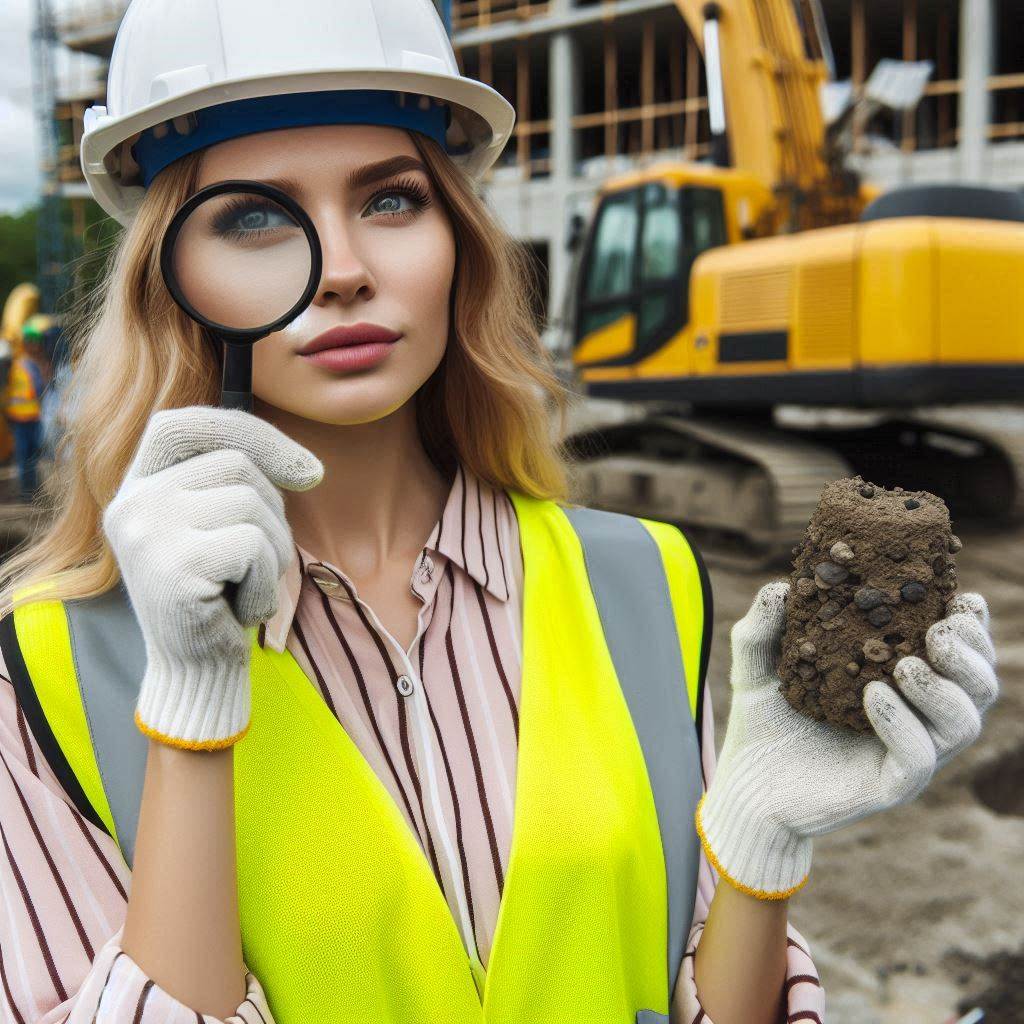
Breaking Stereotypes in Geotechnical Engineering
Women in geotechnical engineering continue to break barriers and challenge longstanding stereotypes.
This field, like many STEM disciplines, has historically been dominated by men.
Addressing and overcoming these stereotypes is crucial for fostering a more inclusive and equitable industry.
Encouraging open dialogue about gender diversity issues is important.
Companies should foster an environment where employees feel comfortable discussing challenges and solutions related to gender biases.
Open communication can lead to more effective strategies and a stronger commitment to change.
Breaking stereotypes in geotechnical engineering involves addressing biases and implementing strategies that promote inclusivity.
By showcasing role models, supporting educational outreach, and creating inclusive work environments, we can challenge and overcome stereotypes.
These efforts will help pave the way for a more diverse and equitable future in geotechnical engineering.
Common Stereotypes and Biases Faced by Women in STEM
One common stereotype is the belief that engineering is inherently a male profession.
This notion implies that women lack the technical skills or aptitude needed for success.
Another bias is the assumption that women cannot handle the demanding physical aspects of geotechnical work.
This stereotype overlooks the fact that competence and capability are not determined by gender.
Women in STEM also face biases related to their commitment and career ambition.
Some may be perceived as less dedicated or less likely to pursue long-term careers in engineering.
These biases can undermine confidence and limit opportunities for women in geotechnical fields.
Networking opportunities help women build professional relationships and gain visibility in the field.
Training and awareness programs can address unconscious biases within organizations.
Educating team members about gender biases and promoting an inclusive culture helps create a supportive environment.
This encourages equitable treatment and recognizes the contributions of all team members.
Strategies for Challenging and Overcoming Stereotypes
Addressing these stereotypes requires proactive strategies at multiple levels.
Promoting visible female role models in geotechnical engineering is one effective approach.
Highlighting the achievements of successful women helps to dispel myths and inspire others.
Educational outreach is another crucial strategy.
Encouraging young girls to pursue STEM subjects through workshops, mentorships, and STEM-focused programs can counteract early biases.
Providing support and resources helps build confidence and interest in engineering careers.
Creating inclusive work environments is essential for overcoming stereotypes.
Companies should implement policies that promote diversity and support women in the workplace.
This includes offering flexible work arrangements, equal opportunities for advancement, and creating a culture of respect.
Mentorship and networking opportunities are also valuable.
Establishing mentorship programs that connect experienced female engineers with newcomers can provide guidance and support.
Read: Biomedical Engineering: Impact on Public Health
Learn More: Certifications to Boost Your Robotics Engineering Career
Promoting Diversity and Inclusion in the Workplace
- Diversity brings a variety of perspectives and ideas to the table, leading to more innovative solutions.
- An inclusive workplace fosters a sense of belonging and respect among employees, improving morale and productivity.
- It helps attract top talent from different backgrounds, leading to a more skilled and well-rounded team.
- Having a diverse workforce can improve company reputation and enhance client relationships.
- A diverse workforce can better reflect the diverse needs of clients and communities, leading to more effective solutions.
- It can also help break down barriers and stereotypes, promoting a more inclusive and welcoming industry culture.
- Having a workforce that represents a variety of backgrounds and perspectives can lead to better decision-making processes.
- It can also help companies better understand and serve a diverse range of clients and stakeholders.
The importance of creating a diverse and inclusive work environment in geotechnical engineering
Creating a diverse and inclusive work environment in geotechnical engineering is crucial for fostering innovation, improving team dynamics, and enhancing problem-solving capabilities.
Diversity and inclusion bring a range of perspectives and experiences that contribute to more robust and creative solutions.
Diverse teams approach problems from various angles, leading to more creative and effective solutions.
This variety of viewpoints can reveal insights that homogeneous teams might overlook, enhancing problem-solving and innovation.
Additionally, a diverse workforce better represents the varied demographics of clients and communities served, improving understanding and responsiveness to client needs, and leading to more tailored and effective solutions.
An inclusive work environment also promotes higher job satisfaction and retention.
Employees are more likely to stay with a company that supports diversity and fosters a sense of belonging.
This sense of inclusion boosts employee morale and strengthens team collaboration, as diverse teams often develop better communication and interpersonal skills.
Companies that prioritize diversity and inclusion are also better positioned for growth, attracting top talent from a broader pool and adapting more effectively to changing market demands and client needs.
The benefits of having a more diverse workforce in the industry
The benefits of a more diverse workforce include a broader range of skills and expertise, enhancing the team’s ability to tackle complex geotechnical challenges.
Diverse teams generate more innovative ideas and solutions, as different viewpoints contribute to breakthroughs and advancements in engineering practices.
Additionally, diverse teams excel in addressing complex problems by leveraging multiple perspectives, which helps in devising more comprehensive and effective solutions.
Improved client relationships also arise from a diverse team, as they can better understand and meet the needs of a varied client base, leading to greater satisfaction with project outcomes.
A strong reputation as an inclusive employer further enhances a company‘s brand and can lead to increased business opportunities.
Diverse teams are also better at identifying and addressing potential risks from different angles, enhancing risk assessment and management for more robust project outcomes.
In summary, creating a diverse and inclusive work environment in geotechnical engineering is essential for driving innovation, improving problem-solving, and enhancing team dynamics.
By prioritizing diversity and inclusion, firms can position themselves for success in a rapidly evolving industry, benefiting from a more effective, creative, and satisfied workforce.
Ultimately, creating a diverse and inclusive work environment in geotechnical engineering is not just the right thing to do‘it’s also a smart business move that can drive success and growth in the industry.
Challenges for Women in Geotechnical Engineering
- Lack of representation: Women are often underrepresented in geotechnical engineering, making it difficult for them to find mentors and role models.
- Gender bias: Stereotypes and unconscious bias can lead to women being overlooked for opportunities or not taken seriously in the field.
- Work-life balance: Like many other STEM fields, geotechnical engineering can be demanding, making it challenging for women to balance work and personal life.
- Discrimination: Some women experience discrimination in the workplace, whether it’s in the form of unequal pay or being passed over for promotions.
- Lack of support: Women may struggle to find a supportive work environment or networks that can help them navigate the challenges of the field.
- Mentorship programs: Companies and organizations can create mentorship programs to support and guide women in the field.
- Diversity initiatives: Promoting diversity in geotechnical engineering can help create a more inclusive and supportive environment for women.
- Networking opportunities: Women can benefit from networking events and conferences where they can connect with peers and industry leaders.
- Professional development: Encouraging women to pursue further education and certifications can help them advance in their careers.
- Recognition of talent: Acknowledging and rewarding the contributions of women in geotechnical engineering can help boost their confidence and visibility in the field.
Addressing the Ongoing Challenges Faced by Women in Geotechnical Engineering
The physically demanding and logistically challenging nature of geotechnical work can be a deterrent for women.
Tasks such as site inspections in remote or harsh conditions often require substantial physical effort and time away from home.
To make the field more accessible, companies can offer flexible work arrangements, such as remote data analysis roles or adaptable fieldwork schedules.
Investing in technology that reduces the need for strenuous fieldwork can also make a significant difference.
Lack of Female Role Models and Mentors
The scarcity of female role models and mentors in geotechnical engineering limits the support available for women entering the field.
Without visible examples of successful women, aspiring engineers may lack the guidance and inspiration needed for career growth.
Establishing mentorship programs and networking opportunities specifically for women can help bridge this gap.
Encouraging senior female engineers to take on mentoring roles and participate in outreach activities can also provide valuable support.
Work-Life Balance
Achieving work-life balance is a continuing challenge, especially with the demanding schedules often required in geotechnical engineering.
Long hours and frequent travel can impact personal and family life.
To address this, organizations should develop and implement family-friendly policies, such as flexible hours and remote work options.
Creating an environment that supports work-life balance and acknowledges the diverse needs of employees can help retain talented women in the field.
Professional Networking and Support
Professional networking and support are critical for career advancement but can be challenging due to the lower representation of women in geotechnical engineering.
Limited networking opportunities can restrict access to career growth and job opportunities.
Expanding professional networks through targeted events, conferences, and industry groups specifically designed for women can help address this issue.
Promoting women’s participation in industry associations and leadership roles can also enhance their visibility and influence.
Institutional and cultural barriers within organizations often hinder women’s advancement.
These barriers include insufficient support for returning mothers, a lack of diversity initiatives, and workplace cultures that may not fully embrace inclusivity.
Addressing these issues requires comprehensive organizational changes, including implementing diversity and inclusion policies, creating supportive environments for returning parents, and fostering a culture of respect and equity.
Opportunities for Growth and Advancement for Women in Geotechnical Engineering
Women in geotechnical engineering face numerous opportunities for growth and advancement, reflecting the industry’s evolving landscape and increasing focus on diversity and inclusion.
As more women enter the field, they encounter a range of pathways to advance their careers, influence industry practices, and shape the future of geotechnical engineering.
One of the key opportunities for growth is through expanding professional networks and seeking mentorship.
Women can benefit significantly from joining industry organizations and attending conferences that focus on geotechnical engineering.
Networking with peers, industry leaders, and mentors provides valuable insights, guidance, and support.
Professional organizations often offer mentorship programs designed to help women navigate their careers, overcome challenges, and achieve their goals.
Engaging with these networks helps women build connections, gain visibility, and access career development resources.
Advanced education and specialization present significant opportunities for women seeking to advance in geotechnical engineering.
Pursuing advanced degrees, certifications, or specialized training can enhance technical expertise and open doors to leadership roles.
Specialized areas, such as environmental geotechnics, soil-structure interaction, or geotechnical risk management, offer pathways to becoming experts in high-demand fields.
Continued learning and professional development help women stay at the forefront of technological advancements and industry trends, making them valuable assets to employers and clients.
Leadership and management roles offer substantial opportunities for women to influence the direction of geotechnical projects and organizations.
Women can aspire to positions such as project managers, department heads, or company executives, where they can shape strategic decisions, drive innovation, and mentor others.
Developing skills in project management, team leadership, and strategic planning is essential for those seeking these roles.
Companies are increasingly recognizing the benefits of diverse leadership teams and are committed to promoting women into influential positions within the industry.
Conclusion
Women in geotechnical engineering face significant challenges, including systemic biases, demanding work environments, and a lack of mentors.
Addressing these issues is crucial for progress.
Promoting gender equality in geotechnical engineering requires overcoming stereotypes and ensuring fair hiring and promotion practices.
Flexible work arrangements can make the field more accessible and inclusive.
Mentorship programs and networking opportunities provide essential support for women’s career growth.
Supporting work-life balance and implementing family-friendly policies help retain talented women.
Organizations must foster a culture of respect and equity, embracing diversity and inclusion.
Breaking these barriers enhances the profession, benefiting from diverse perspectives and skills.
Promoting gender equality in geotechnical engineering is essential for a more innovative and dynamic industry.
Addressing systemic biases and creating supportive work environments are crucial steps.
Increasing female representation and success in geotechnical engineering involves mentorship, professional networking, and inclusive policies.
By overcoming these challenges, the industry can harness the full potential of diverse talents and perspectives.
Supporting women in geotechnical engineering ensures a more equitable and progressive field.
This commitment to gender equality will drive positive change, inspiring future generations and strengthening the profession.
Transform Your Career Today
Unlock a personalized career strategy that drives real results. Get tailored advice and a roadmap designed just for you.
Start Now[E-Books for Sale]
The Big Book of 500 High-Paying Jobs in America: Unlock Your Earning Potential
$19.99 • 500 High-Paying Jobs • 330 pages
Explore 500 high-paying jobs in America and learn how to boost your career, earn more, and achieve success!
See All 500 High-Paying Jobs of this E-Book
1001 Professions Without a Degree: High-Paying American Jobs You Can Start Now
$19.99 • 1001 Professions Without a Degree • 174 pages
Discover 1001 high-paying jobs without a degree! Unlock career tips, skills, and success strategies for just $19.99!

